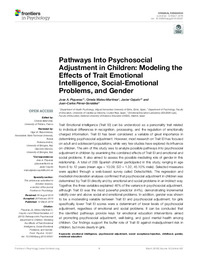Por favor, use este identificador para citar o enlazar este ítem:
https://hdl.handle.net/11000/36029Registro completo de metadatos
| Campo DC | Valor | Lengua/Idioma |
|---|---|---|
| dc.contributor.author | Piqueras, Jose A | - |
| dc.contributor.author | Mateu-Martínez, Ornela | - |
| dc.contributor.author | Cejudo, Javier | - |
| dc.contributor.author | Pérez-González, Juan Carlos | - |
| dc.contributor.other | Departamentos de la UMH::Psicología de la Salud | es_ES |
| dc.date.accessioned | 2025-03-20T13:45:17Z | - |
| dc.date.available | 2025-03-20T13:45:17Z | - |
| dc.date.created | 2019-03-12 | - |
| dc.identifier.citation | Frontiers in Psychology, 12 Mar 2019, 10:507 | es_ES |
| dc.identifier.issn | 1664-1078 | - |
| dc.identifier.uri | https://hdl.handle.net/11000/36029 | - |
| dc.description.abstract | Trait Emotional intelligence (Trait EI) can be understood as a personality trait related to individual differences in recognition, processing, and the regulation of emotionally charged information. Trait EI has been considered a variable of great importance in determining psychosocial adjustment. However, most research on Trait EI has focused on adult and adolescent populations, while very few studies have explored its influence on children. The aim of this study was to analyze possible pathways into psychosocial adjustment in children by examining the combined effects of Trait EI and emotional and social problems. It also aimed to assess the possible mediating role of gender in this relationship. A total of 268 Spanish children participated in this study, ranging in age from 8 to 12 years (mean age = 10.09, SD = 1.32, 45.10% male). Selected measures were applied through a web-based survey called DetectaWeb. The regression and mediation/moderation analyses confirmed that psychosocial adjustment in children was determined by Trait EI directly and by emotional and social problems in an indirect way. Together, the three variables explained 46% of the variance in psychosocial adjustment, although Trait EI was the most powerful predictor (44%), demonstrating incremental validity over and above social and emotional problems. In addition, gender was shown to be a moderating variable between Trait EI and psychosocial adjustment; for girls specifically, lower Trait EI scores were a determinant of lower levels of psychosocial adjustment, regardless of emotional and social problems. It can be concluded that the identified pathways provide keys for emotional education interventions aimed at promoting psychosocial adjustment, well-being, and good mental health among children. Our findings support the buffer role of Trait EI against maladjustment risk in children, but more clearly in girls. | es_ES |
| dc.format | application/pdf | es_ES |
| dc.format.extent | 11 | es_ES |
| dc.language.iso | eng | es_ES |
| dc.publisher | Frontiers Media | es_ES |
| dc.rights | info:eu-repo/semantics/openAccess | es_ES |
| dc.rights.uri | http://creativecommons.org/licenses/by-nc-nd/4.0/ | * |
| dc.subject | emotional intelligence | es_ES |
| dc.subject | psychosocial adjustment | es_ES |
| dc.subject | social acceptance/rejection | es_ES |
| dc.subject | childhood | es_ES |
| dc.subject | gender | es_ES |
| dc.subject | emotional education | es_ES |
| dc.subject.other | CDU::1 - Filosofía y psicología::159.9 - Psicología | es_ES |
| dc.title | Pathways Into Psychosocial Adjustment in Children: Modeling the Effects of Trait Emotional Intelligence, Social-Emotional Problems, and Gender | es_ES |
| dc.type | info:eu-repo/semantics/article | es_ES |
| dc.relation.publisherversion | https://doi.org/10.3389/fpsyg.2019.00507 | es_ES |

Ver/Abrir:
2019_105_Investigacion_Publicaciones_Pathways Into Psychosocial Adjustment.pdf
674,9 kB
Adobe PDF
Compartir:
 La licencia se describe como: Atribución-NonComercial-NoDerivada 4.0 Internacional.
La licencia se describe como: Atribución-NonComercial-NoDerivada 4.0 Internacional.
.png)